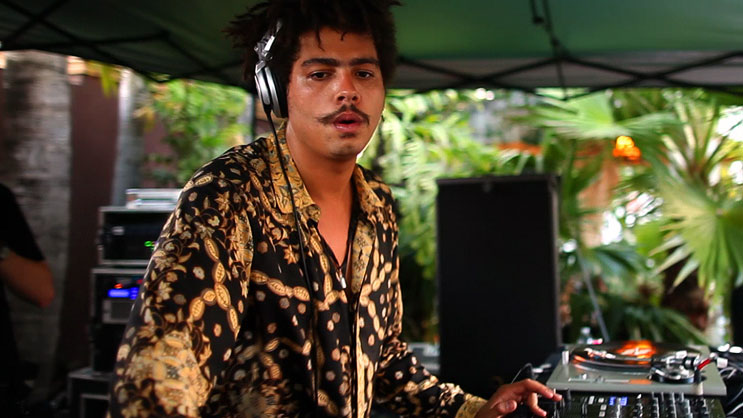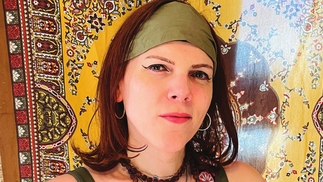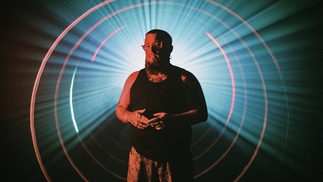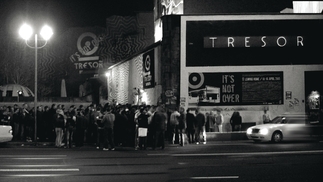SETH TROXLER: FOOD FOR THOUGHT
If anyone is dance music's renaissance man, it's Detroit's Seth Troxler. There's a lot more to Seth than his hedonistic image might suggest, as DJ Mag finds out when he cooks us a meal at his house in London...

Still bleary-eyed after a night DJing to hundreds who braved freezing January weather to hear him spin on a Wednesday evening in Bristol, Seth Troxler is back in London doing the two other things he does best. Holding forth in his kitchen whipping up an evening meal for his friends, the air is as thick with Seth’s Gatling gun chatter as it is with the mouthwatering scents of garlic and fried sausage.
“The thing about food I find really beautiful is that the one thing that every human on this entire planet has in common is wanting to sit down and have a good meal with the people that they love,” says the man who — as proprietor of the Smokey Tails barbeque joint in Shoreditch and three-time winner of the Amsterdam Dance Event’s annual DJ cook-off — is becoming almost as renowned for tickling tastebuds as ears. “For me feeding people is like playing music. I get off on seeing people enjoying themselves. So if I’m having sex with a girl I get off on seeing them cum.
If I’m playing records it’s not about my own pleasure — my own pleasure is seeing the pleasure of others, and it’s the same thing with food.”
Then, his thoughts flashing as fast as the knife through the onions, Seth throws in another slice of his life’s philosophy. “My dream would be to take Anthony Bourdain, Wolfgang Voigt, DJ Hell and Laurent Garnier and combine them into one person,” he muses. “That’s what I want to be: a guy travelling around making food on TV, then playing some really cool gigs like Laurent Garnier, you do some fashion stuff like DJ Hell and Wolfgang is for the art. But since I’m black I also get the swagger and chocolate gorgeous skin of Pharrell. That’s like Seth times 50 — the ultimate hyperman!”
Thing is, if Seth Troxler is beginning to seem like anyone else these days, it’s probably more Russell Brand. Both, after all, have an image as hard-partying playboys, which means both are finding it difficult to be taken seriously now they’re cranking up their motor-mouths to try and say something a bit more thoughtful. With his recent outspoken comments on everything from the state of electronic music to climate change and race relations, Seth has become a polarising figure. There are those cheering him on as he savages Avicii’s management team at the 2014 IMS Summit in Ibiza, or as he pens columns claiming 90% of dance music festivals are “fucking horrible” with the same level of vituperation as Brand ranting at Nigel Farage on Question Time.
Then there are those who see him as not only a man with an ego even bigger than his gob, but someone who — with spinning at Kate Moss’ 40th birthday party and being in a select group including Tiësto and Diplo to appear in his own episode of Channel 4’s Superstar DJs with Annie Mac amongst his recent escapades — is more part of the solution to the problem of the increasing commercialisation of electronic music currently getting him so hot under the collar of his trendy T-shirts.
“Funny you should say that because I’ve just read his new book,” Seth replies when DJ Mag points out the parallels. “The beginning of media exposure for me was a few clownish things so people now have this expectation of what I’m going to be like. I can still be like that, but now I’m more like this reformed mentalist going ‘I’m all enlightened’. People are like, ‘No you’re not — you’re an idiot’.”
“Not at all,” he answers, when asked if he’s intentionally setting himself up as a spokesman for the underground. “It’s just that things have been changing and I’ve been speaking up about it. I have such a deep dedication to this kind of society and how trends are creating and changing the business in electronic music and its core ideal. It’s really the difference between art and entertainment, and the underground scene is about culture and the arts.
You can’t look at commercial dance music and the underground in the same way that you can’t compare a Hollywood blockbuster and an arthouse film. One is coming from the point of capitalism and strategy and one is coming from the point of trying to create some kind of culture. That’s something that I want to preserve and be part of.”

FORTHRIGHT
Seth isn’t the first DJ to have these thoughts of course, nor the first to say them. What does make him different is the fact that he’s prepared to name names. Whereas rock music has a long history of feuds, such as Oasis vs. Blur or Courtney Love vs. everyone she ever seems to have met, and hip-hop has been pretty much based on beefs even before Boogie Down Productions declared ‘The Bridge Is Over’, the most famous names in electronic music — with the odd honourable exception like Dave Clarke or Deadmau5 — often look like they’re having something of a self-congratulatory circle jerk.
In other words very few top-flight DJs would dare call Steve Aoki a ‘c**t’ — as Seth did in an online article — for fear of awkward moments when they next share a VIP suite. Although outspoken as he might be, Seth’s still savvy enough not to completely bite the bait DJ Mag is dangling.
“I don’t really agree with the music of Dimitri Vegas & Like Mike or Avicii and all this shit — I call it sonic ear-rape — but if I name some names right now that becomes the headline and it takes away from the greater discussion.
Which is about the fact that that type of music has become the representation of all dance music, and that’s not right. Someone dies at Ultra and suddenly all electronic music is demonised in the media. I mean, I’ve played at Ultra but my point there was to try and expose more kids to more music.
Everyone has their entry point but I think the bigger problem isn’t with the people making the music or the people consuming the music — everyone can do what they do and I respect that. The real problem is the people promoting this commercialised culture over an underground scene. They’re like hedge fund capitalists — they completely buy the scene and rinse it and then leave it. It’s fucked.”
There’s surely a slight whiff of hypocrisy here though? After all, Seth has talked in the past about the need to turn himself into a ‘brand’ and hasn’t seemed too shy taking cash from Desperados to promote its beer. “I’m trying to make a living for myself,” he counters.
“If some beer company wants to pay me a couple of bucks to stand up and smile then cool, but at the end of the day the music that I play and the attitude I have is the same. If you had really phenomenal artists like Björk endorsing Coke I think that’d be cool! I’m not saying I’m some underground DJ like Ben UFO, but the music and content that I deliver is very much a representation of that idea.
I am a beacon or gospel or star of colour that talks about our real culture amongst a field of grey.” According to Seth, “It’s a bit like the original Civil Rights movement just took some people to stand up and say ‘Fuck this! This isn’t right.”
REPRESENTATION
Now whilst comparing the struggle for black equality to a distaste for corporations using neon rave to sell plastic crap to teenagers would sound pretty crass coming from most people, Seth has a deeper dedication to that ideal.
His Tuskegee label, formed with The Martinez Brothers, showcases music from artists of colour and takes its name from a black university in Alabama. It’s a fitting tribute, given that the label is about education as well as music, highlighting dance music’s original roots at a time when the scene seems to have whitewashed them out.
“We were just looking at all the old house producers and the old New York and Detroit and Chicago stuff,” Seth recalls. “We were struck by the fact that there aren’t many people of colour in dance music now. What really happened to that, because it’s music from a different cultural perspective? So I was like, ‘Let’s start a label from that perspective’. We want to have it be — not exclusively for people of colour — but to have it as a platform for people of our cultural background to identify with.
Then they can say ‘Hey! Dance music’s actually cool! I don’t have to be this stereotypical kind of urban youth and only identify with urban music’, and then start looking into where it comes from. “Because when I was growing up with that background, if you listened to house music people thought you were either really into drugs or gay. It wasn’t cool at all. I mean, The Martinez Brothers and I were offered so many opportunities out of what would have been our life otherwise.
We’ve been able to achieve things beyond all our wildest dreams just through being into dance music, so we want to recreate a positive influence for people. We go to South America and other places where these guys are only seeing European DJs, and it’s hard for them to really relate to. Then you’ve got two Puerto Rican guys and me on-stage and they’re like ‘Whoa! I too could do that’. It’s cool to give people that empowerment.”
There is a danger, Seth acknowledges, that running something perceived as an ‘ethnic label’ could ghettoise these artists to some extent, but as he points out, “A label might only have Cologne-based artists — and that’s OK — so why should it be risky to say ‘We’re going to have a label only of people of colour’?” Anyway, he states, black culture is already heavily stereotyped, with repercussions that run way beyond the dancefloor.
The recent shootings of unarmed black men in America for example, show how — over 50 years after the Civil Rights movement began — African-Americans are still treated as a criminal underclass, a perception Seth believes is reinforced by many of the dominant cultural portrayals.
“In America, when gangsta rap came in it became really uncool for people of colour to listen to house music,” he elaborates. “Through the media that image translated globally as music that people of colour identified themselves with, which meant that people of poverty identified themselves with it.
It became globally identified with people of a lower socio-economic situation, and the glorifications of money and violence and of all these really bad human characteristics in that music being popularised by the record companies came at the detriment of society as a whole.
“One of the biggest things in my life was not getting into hip-hop, because I saw how it affected the community around me,” he continues, pushing the sizzling onions around the pan whilst warming to his theme.
“Generally, if you look at black communities pre-1980s before crack and this new music came in — those communities were really sprouting. We were post-Civil Rights — we were like The Jeffersons theme ‘Movin’ On Up’ — and then after the mass glorification of this new trend that was at first political but then turned into something else with gangsta rap, you see the mass deterioration of our communities. You can’t not say there’s at least some sort of correlation, and if you look around the world today, the places with the most crime also relate to that music.
If you look at really empowered music like house music, it’s uplifting people and culture and there’s a change in the awareness of the people that listen to it. Then when you look at really fucked up materialistic ‘bitches and hoes’ music, what picture does that paint for society? That horrible image of who we are as people has now become a sign of status.”

VOICE OF DISSENT
But does he think electronic music can be a voice of dissent in the same way as the soul music of Sam Cooke soundtracked the struggles of the '60s? After all, whilst protest songs like ‘A Change Is Gonna Come’ — and even early '80s hip-hop like Grandmaster Flash & The Furious Five’s ‘The Message’ — contained explicitly political lyrics, electronic music isn’t just predominantly instrumental, but often seems concerned solely with hedonism, with escaping from the world rather than engaging with it.
“I think electronic music is inherently a voice of protest because listening to electronic music you are still rebelling against the status quo,” he claims. “When I was young listening to electronic music was a way I defined myself to be different. The whole idea of clubbing and staying up late is a rebellion against society.”
Being raised near Detroit, Seth says, both gave him awareness of social inequalities — “The fact I grew up amidst poverty and now I’m playing at Kate Moss’ birthday — the juxtaposition is crazy. But it makes you more culturally aware of what’s actually going on you know?” — and first-hand access to electronic music at one of its most important sources, through his first job working at the city’s Melodies and Memories record store.
“I was lucky to have a really great entry point,” he reflects. “Going to raves with Underground Resistance when you’re 14 is why I’m in the position I am today. A big part of my ideas of how I want to lead my career as a DJ — being self-aware of the generation I’m in — is as someone who preserves dance music culture.
I’m this guy who came in as a kid at the end of the golden generation — like how it was seeing Robert Johnson or the early creators of blues. I got to see the real originators and live at the end of those times. So if we want another two or three generations to be able to enjoy that original idea, it needs to be preserved. I’m privileged to be a part of that legacy.”
Although Seth claims to be “Michigan to the core” — he’s even named his new food venture selling hot dogs in Old Street station The Detroiter — he also reveals that when he goes back to the States “I feel like a European amongst all these American guys”. The result, of course, of eight years on this side of the Atlantic, first in Berlin, where he arrived when he was 21 to lap up the city’s minimal techno scene, and now in London, where he’s been hanging out with the likes of Jamie Jones and Craig Richards, and which he jokingly refers to as “my finishing school”.
“I love that English underground rave sound,” he enthuses. “But I also think England is the place that most fits my ideals of a fair society built on people respecting each other.”
That seems like quite a statement when the news is full of UKIP’s anti-immigration rhetoric and the Tories attacking benefit ‘scroungers’ every night though? “Yeah — but in America racial segregation only really ended 40 years ago.
That was basically the end of slavery and that’s so close in time, but England doesn’t really have to deal with that. I’m in Dalston and there’s so many mixes of people here — it’s the one multicultural country in the world that actually works.”
Seth should know after all, having seen most of the globe as one of the world’s hardest-touring — and reputedly hardest-partying — DJs. He’s still trying to live down his infamous video interview with DJ Mag at Miami WMC — “The one interview I can never get over” he wearily concedes — and his appearance on Superstar DJs with Annie Mac wasn’t exactly a portrait of a delicate wallflower.
“I just like playing records at the end of the day,” he beams. “You work while you can and I’m not going to keep up this pace forever. I want to entertain more people but now I’m taking things more slowly as well. But I also embrace a culture that embodies hedonism because that’s part of the cultural ideal that I represent, and connect with dance music. I like that freedom — I like that hedonism, and part of that isn’t leading some kind of celebrity rock star life — it’s just that I’m a fucking animal! I like being an animal! I’m a 29 year-old guy having fun travelling the world. What’s wrong with that?”
Nothing. Except that leading a literally jet-setting lifestyle is somewhat harder to justify when Seth starts talking about climate change being the biggest danger facing humanity a few minutes later. “I don’t drive — I don’t even have a licence — but I suppose that is a kind of Russell Brand scenario where you’re preaching for the poor whilst being in the 1%,” he admits.
“But at the same time I think I’m also trying to do stuff for the world by playing music to uplift people. I think the greater responsibility isn’t really within the public who are trying to live their lives — it’s within governments to take real stances for the greater whole.”
PRODUCTION
If consistency sometimes seems to be a challenge for Seth’s thinking, it suddenly seems to be for his sauce as well. Realising he’s forgotten to add tomatoes, he runs yelping around the kitchen turning the cupboards out in a clatter of pans, before returning with a carton of passata. Pasta saved, conversation turns to something else he’s found recently: his way into the studio again to start producing his own music.
Working with New York’s Phil Moffa, the first fruits of the collaboration was the recent ‘Rogue Music’ EP on Hypercolour, and the pair are now putting the finishing touches to an album Seth describes as “acid sci-fi voodoo”. He also reveals he’s making his own solo tracks “that are kind of like the tech-house minimalist style I play”.
It’s an enticing prospect, given that Seth has arguably become better-known as a guest vocalist on other people’s music rather than creator of his own in the last few years, lending his loquacious tones to tracks by his good mates Deetron, Art Department and Tiefschwarz amongst others. So does he think he’s got a point to prove now he’s in front of the computer rather than the microphone again?
“It is frustrating that people sometimes don’t give me the kudos of being a serious artist,” he admits. “People forget the early stuff I did for Omar S’ label and Circus Company, and the stuff that we did as Visionquest together — there are some really crazy tracks.”
You definitely get the impression though that Seth — garrulous and gregarious as he is — does genuinely relish sharing the credit with others: provided they meet his exacting standards. “I don’t even have any friends who like bad music so there’s no chance I’m going to work with someone who does,” he says at one point.
In fact, he says he pulled out of Visionquest — the DJ and label collective he formed with fellow Michiganites Lee Curtiss, Ryan Crosson and Shaun Reeves — specifically to save their friendship because their exposure was becoming unequal. “It was becoming weird and stressful for all of us because no matter what we did, I kept getting all the notoriety.” However, that has now given Seth the time and space to establish two other labels alongside Tuskegee as platforms for music he respects.
The first is Play It Say It, which puts out “guaranteed club bombs for mature DJs” by the likes of Steve Lawler, whilst he’s full of even more enthusiasm for the forthcoming wares on his indie-rock Soft Touch label, calling forthcoming material from White Elephant “just incredible”.
But, as he candidly states, the main reason he’s not made much of his own music is that “I was just having a blast DJing and travelling the world”. Something he says he still loves but, with the sauce bubbling away in the pan, Seth explains that he’s now looking further than just the next party. “I’ve done this for half my life and that’s amazing, but I think life is something that’s really beautiful and expansive.
You can have so many different experiences so why dedicate my life to just one?” he ponders. “I’m already building my exit plan. That’s why I’ve got the restaurants, and in five years’ time I maybe want to meet someone and have a kid. It’d be cool to just step away and become a memory. Music will always be part of my life and I’m grateful for the influence it’s had on the way I perceive life and culture.
It’s let me travel when some people don’t even have the fortune to leave their own cities. I’ve been able to expand my mind and become more conscious and aware of my personal self. Within electronic music there’s lots of individuals on that quest to discover a realisation for existence. That’s inspired me to continue on a path to find life’s greater purpose.”
Then dinner’s served, with a healthy portion of food for thought.






